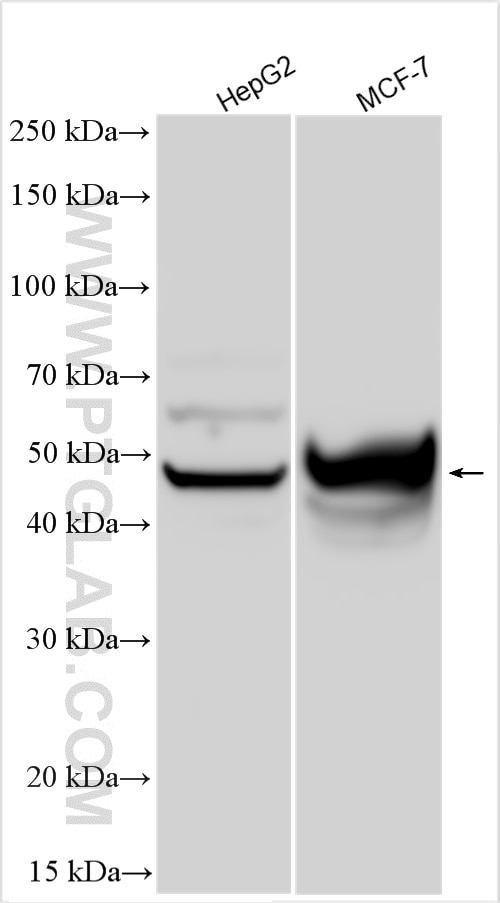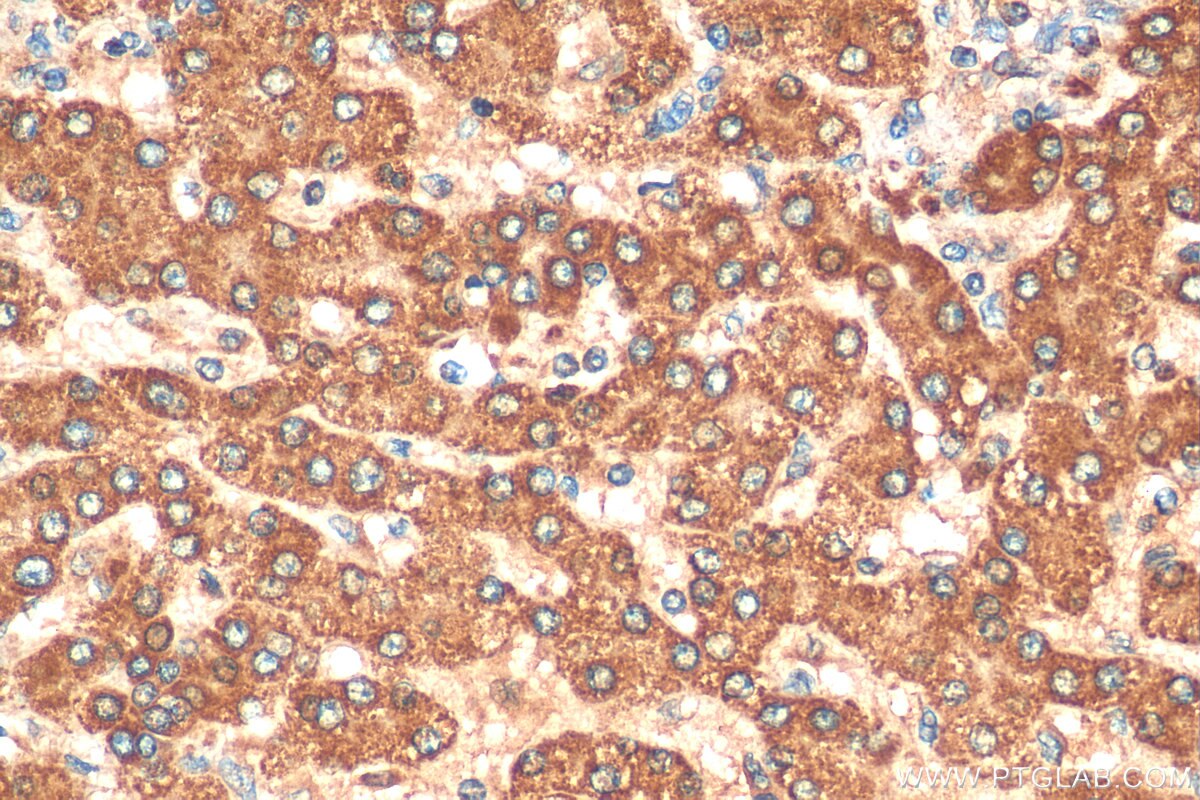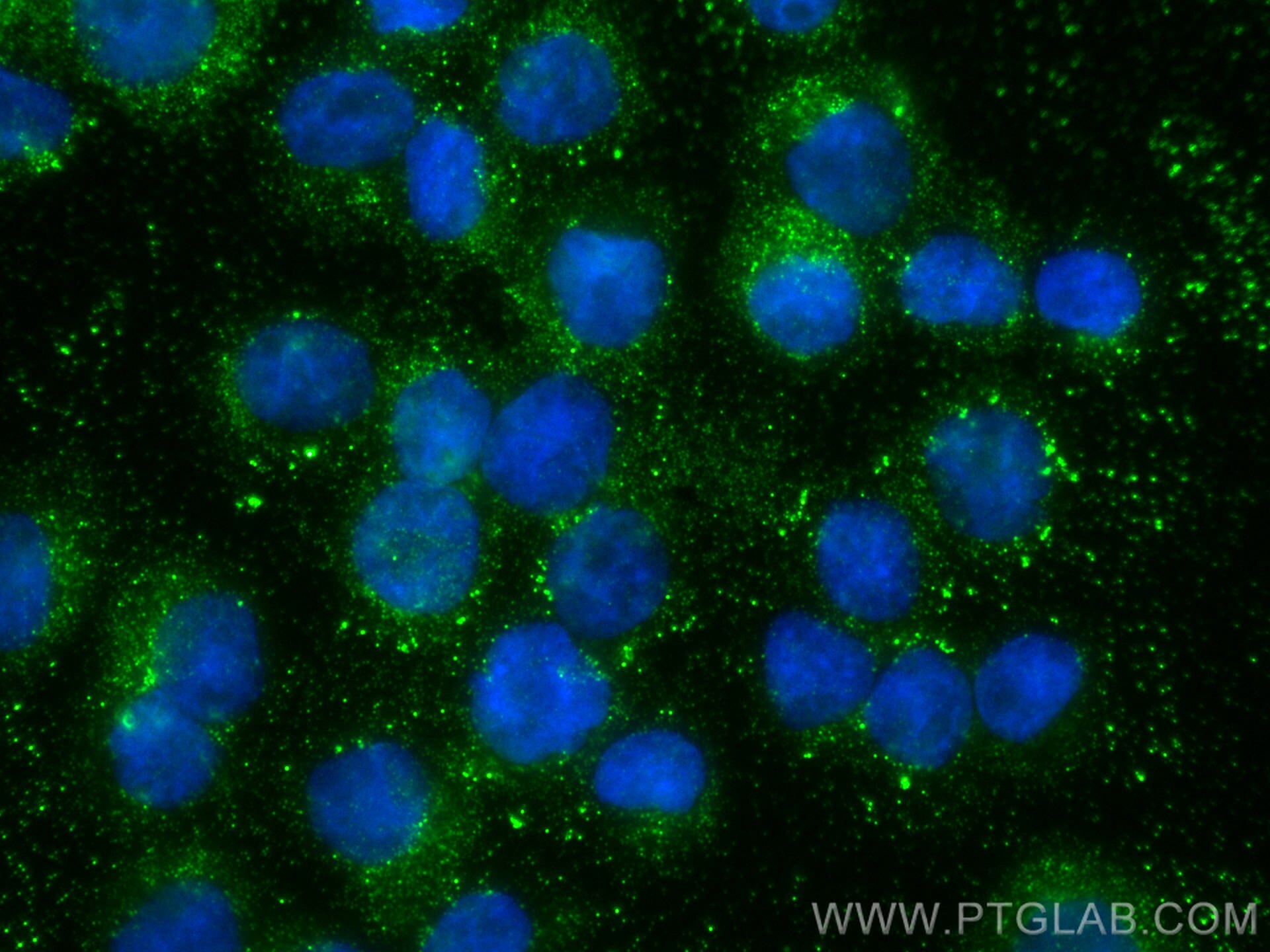- Featured Product
- KD/KO Validated
ANGPTL7 Polyklonaler Antikörper
ANGPTL7 Polyklonal Antikörper für WB, IHC, IF/ICC, ELISA
Wirt / Isotyp
Kaninchen / IgG
Getestete Reaktivität
human und mehr (1)
Anwendung
WB, IHC, IF/ICC, ELISA
Konjugation
Unkonjugiert
Kat-Nr. : 10396-1-AP
Synonyme
Galerie der Validierungsdaten
Geprüfte Anwendungen
| Erfolgreiche Detektion in WB | HepG2-Zellen, MCF-7-Zellen |
| Erfolgreiche Detektion in IHC | humanes Leberkarzinomgewebe Hinweis: Antigendemaskierung mit TE-Puffer pH 9,0 empfohlen. (*) Wahlweise kann die Antigendemaskierung auch mit Citratpuffer pH 6,0 erfolgen. |
| Erfolgreiche Detektion in IF/ICC | THP-1-Zellen |
Empfohlene Verdünnung
| Anwendung | Verdünnung |
|---|---|
| Western Blot (WB) | WB : 1:1000-1:6000 |
| Immunhistochemie (IHC) | IHC : 1:50-1:500 |
| Immunfluoreszenz (IF)/ICC | IF/ICC : 1:50-1:500 |
| It is recommended that this reagent should be titrated in each testing system to obtain optimal results. | |
| Sample-dependent, check data in validation data gallery | |
Veröffentlichte Anwendungen
| KD/KO | See 1 publications below |
| WB | See 6 publications below |
| IHC | See 1 publications below |
| IF | See 2 publications below |
Produktinformation
10396-1-AP bindet in WB, IHC, IF/ICC, ELISA ANGPTL7 und zeigt Reaktivität mit human
| Getestete Reaktivität | human |
| In Publikationen genannte Reaktivität | human, Maus |
| Wirt / Isotyp | Kaninchen / IgG |
| Klonalität | Polyklonal |
| Typ | Antikörper |
| Immunogen | ANGPTL7 fusion protein Ag0596 |
| Vollständiger Name | angiopoietin-like 7 |
| Berechnetes Molekulargewicht | 40 kDa |
| Beobachtetes Molekulargewicht | 45 kDa |
| GenBank-Zugangsnummer | BC001881 |
| Gene symbol | ANGPTL7 |
| Gene ID (NCBI) | 10218 |
| Konjugation | Unkonjugiert |
| Form | Liquid |
| Reinigungsmethode | Antigen-Affinitätsreinigung |
| Lagerungspuffer | PBS mit 0.02% Natriumazid und 50% Glycerin pH 7.3. |
| Lagerungsbedingungen | Bei -20°C lagern. Nach dem Versand ein Jahr lang stabil Aliquotieren ist bei -20oC Lagerung nicht notwendig. 20ul Größen enthalten 0,1% BSA. |
Hintergrundinformationen
ANGPTL7, also named as CDT6, is a member of the angiopoietin-like (ANGPTL) family of proteins, which are important regulators of Angiogenesis. It is a secreted 45-kDa glycoprotein that folds into a homotetramer structure linked by disulfide bonds. ANGPTL7 was originally discovered in the stromal layer of the corne, and moderately expressed in the human trabecular meshwork. The chromosomal location of the ANGPTL7 gene (1p36.22) is within the GLC3B locus (1p36.2-1p36.1) of primary congenital glaucoma, supporting ANGPTL7 as a candidate glaucoma gene. ANGPTL7 could have a pathogenic role in glaucoma, and may serve as a potential therapeutic target.
Protokolle
| Produktspezifische Protokolle | |
|---|---|
| WB protocol for ANGPTL7 antibody 10396-1-AP | Protokoll herunterladen |
| IHC protocol for ANGPTL7 antibody 10396-1-AP | Protokoll herunterladen |
| IF protocol for ANGPTL7 antibody 10396-1-AP | Protokoll herunterladen |
| Standard-Protokolle | |
|---|---|
| Klicken Sie hier, um unsere Standardprotokolle anzuzeigen |
Publikationen
| Species | Application | Title |
|---|---|---|
FASEB J Angptl7 promotes insulin resistance and type 2 diabetes mellitus by multiple mechanisms including SOCS3-mediated IRS1 degradation.
| ||
Osteoarthritis Cartilage Effects of mechanical stress and deficiency of dihydrotestosterone or 17β-estradiol on Temporomandibular Joint Osteoarthritis in mice. | ||
Front Mol Biosci An Extracellular Matrix-Based Signature Associated With Immune Microenvironment Predicts the Prognosis and Therapeutic Responses of Patients With Oesophageal Squamous Cell Carcinoma. | ||
Genes Cells Evidence for a role of angiopoietin-like 7 (ANGPTL7) in extracellular matrix formation of the human trabecular meshwork: implications for glaucoma. | ||
Commun Biol ANGPTL7, a therapeutic target for increased intraocular pressure and glaucoma | ||
Hum Mol Genet Rare protective variants and glaucoma-relevant cell stressors modulate angiopoietin-like 7 expression |
Rezensionen
The reviews below have been submitted by verified Proteintech customers who received an incentive for providing their feedback.
FH Kenzo (Verified Customer) (01-05-2024) | The antibody worked well for immunofluorescence on frozen mouse eye sections.
|




